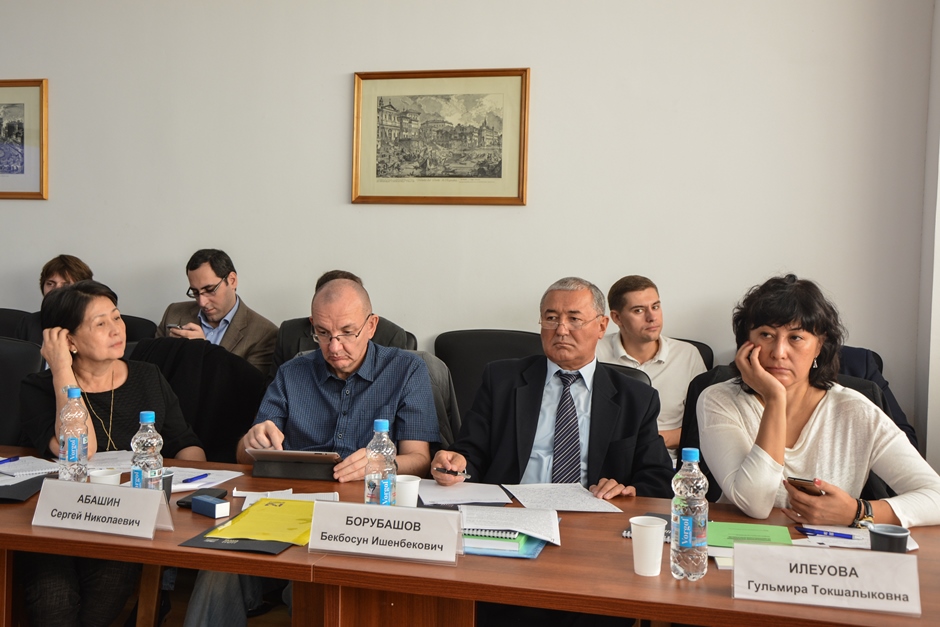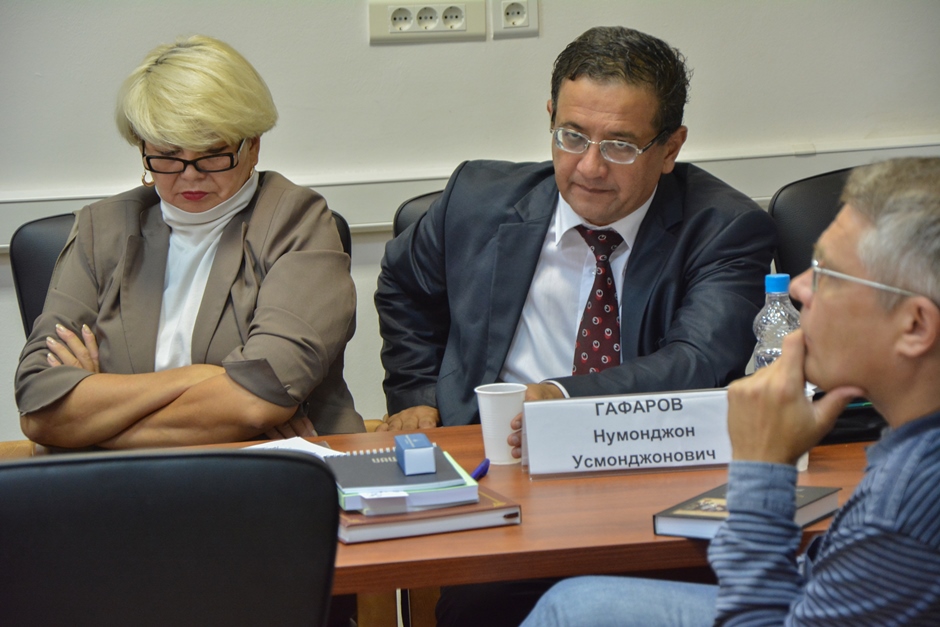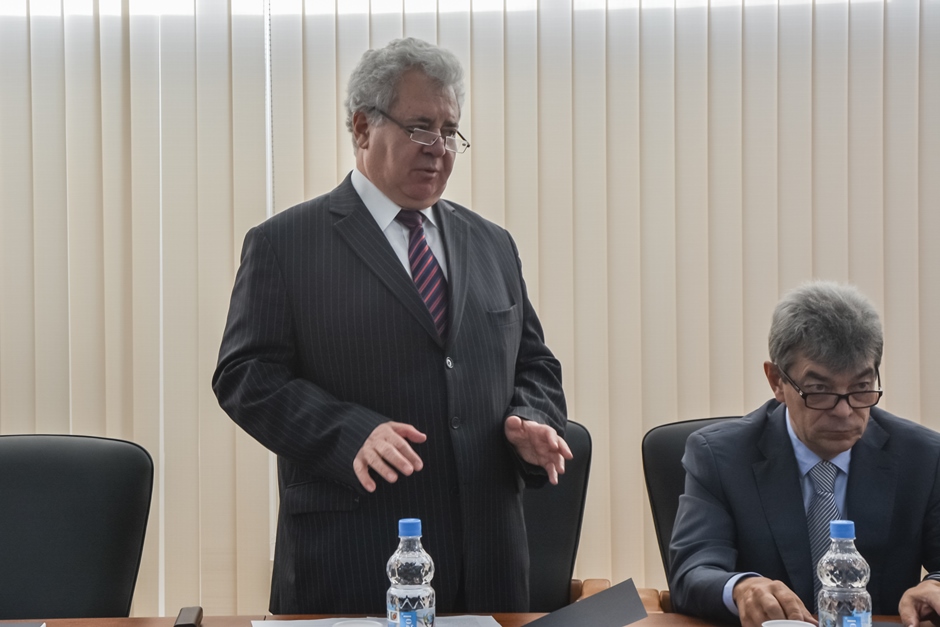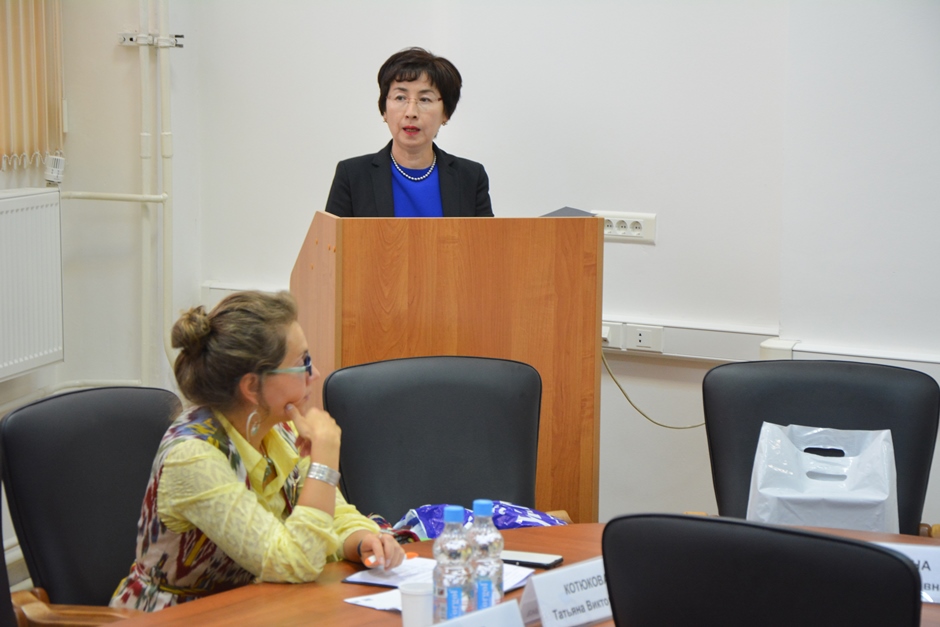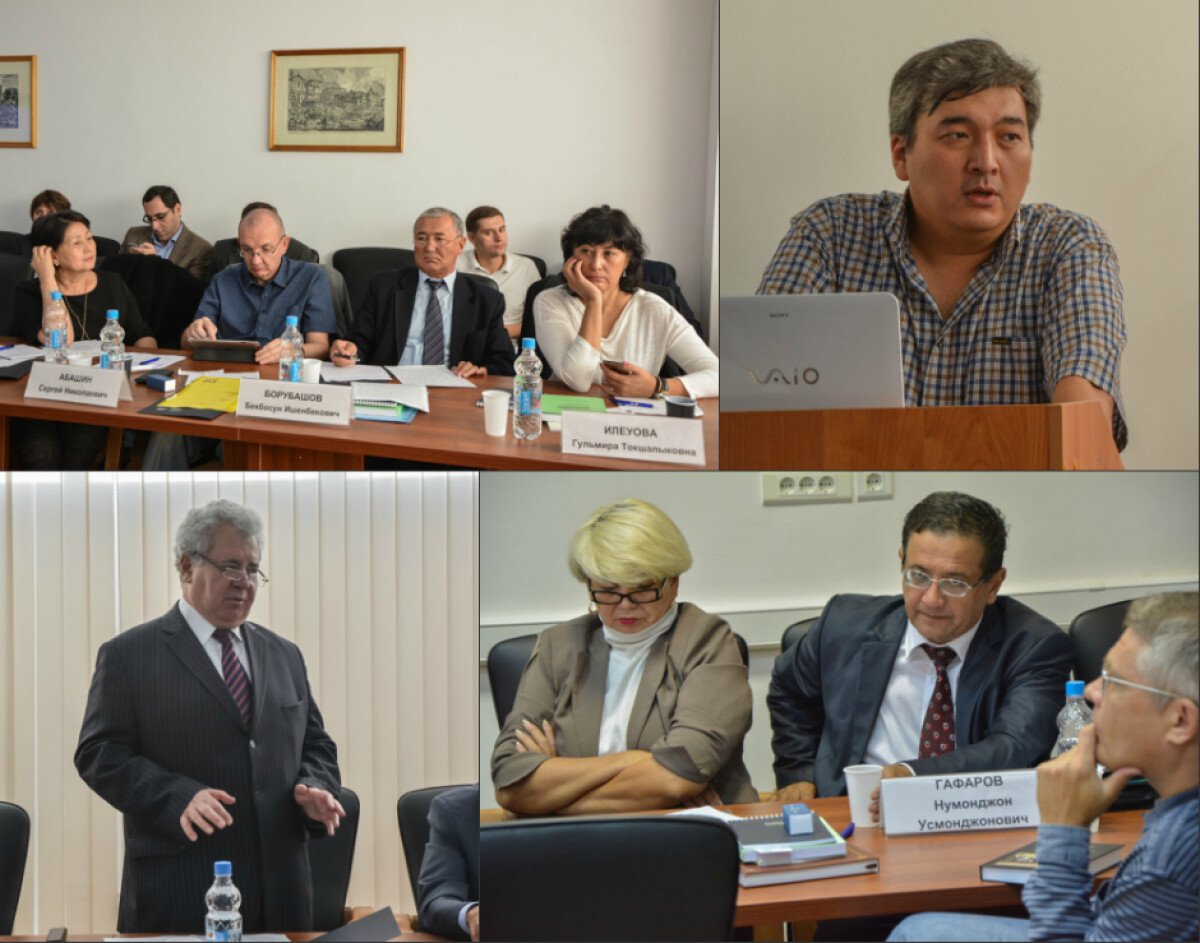
"Civilizational and cultural aspects of relations between Russia and people of Central Asia in the early XX century" International scientific-practical conference devoted to the 100th anniversary of Turkestan uprising in 1916 was held on September 18 at History faculty in Lomonosov MSU in Moscow. It was organized by Information-analytical center for the study of post-soviet society, "Znanie" society of Russia, Russian State Humanitarian University (RSHU), Institute of World History RAS, F.Mardzhani Fund. Scientists-historians, political scientists, sociologists, lawyers, economists from Russia, Kazakhstan, Kyrgyzstan, Tadzhikistan, Uzbekistan participated in the conference.
National-liberation uprising of 1916 is a common historic event for people of Central Asia, which is one of the brightest manifestations of general crisis in the Russian Empire in the pre-revolutionary period. It was caused by the complex of social-political and economic reasons: the active migration policy of tsarism and the mass seizure of lands from indigenous population of the region, strengthening of the colonial and social oppression, excessive tax and increase of all types of fees. All of these led to a sharp deterioration of situation of the masses and the exacerbation of the national issue. The Royal decree dated June 25, 1916 on the mobilization of indigenous population of Turkestan to rear works during the First World War was the immediate reason for mass protests, the catalyzer of the tense socio-economic and political situation in the region. The bloody conflict and the atrocity committed on both sides among local inhabitants and Russian immigrants. The uprising was suppressed by the punitive detachment on the whole territory of Turkestan.
The organizers gathered representatives of scientific community of Russia and Central Asia countries to the conference a year before the 100th anniversary of tragic page of our common history, and they have structured the program in such way that it allowed a systematic approach to the problem during the discussion. The exchange of research practice and works of science schools of Russia and other former Soviet states was held to study the issue. A rector of RSHU, Head of Near Abroad History Department of Lomonosov MSU, PhD in History, professor Efim Pivovar opened the conference and emphasized the critical importance of the academic discourse before the 100th anniversary of the events. An important task is an objective and comprehensive analysis of the situation from the view of civilizational and cultural aspects of people interaction. He has noticed that history knowledge and education are considered for the future and concluded that an important task is to minimize the impact of politics on the historic events and use of historic materials in political objectives.
Deputy dean of History faculty of MSU, professor Ivan Tuchkov has noticed that it is necessary to consider the fragmentation of the existing source base in assessment and analysis of events of 1916. Many documents are still not introduced into scientific circulation. Tatyana Kotyukova, senior researcher of Institute of World History of RAS, Candidate of History Sciences told about the preparation of documents collection of 1916 on the basis of materials from SARF, RSHA and the archives from Central Asia states. She drew the attention of colleagues to the fact that many aspects of the topic still remain a big mystery: who prepared the text of the Tsar decree on the conscription of non-Russians to rear works, organization and coherence of detachment and the presence of external forces coordination were recognized.
Daniyar Ashimbayev, an editor of Kazakh bibliographic encyclopedia "Who is who in Kazakhstan" has noticed that the historians studied the causes, course and consequences of the uprising well. However, the assessment given by them are different and contradictory, many documents are not disclosed, there still few publications that objectively portray the events of 1916. The political analyst also noticed that with the exception of some nonfiction works, research about national liberation uprising of Kazakhs of Chinese (Eastern) Turkestan (Xinjiang) in 40s-50s of XX century is not enough. The organizers of protests in the Soviet period against German autonomy, Zheltoksan 1986 remain in the shadow; no one deals with these issues. According D.Ashimbayev «an objective approach to the World history of Russian and Central Asia occupying relatively stable positions in history sciences is on the periphery of the basic processes in information and political space»; in modern conditions of information society it is necessary to avoid distortion and politicization of historic events in the field of interethnic relations in the region. The President of the public fund "Strategy" (Almaty) Gulmira Ileuova recalling to the results of the survey noted that current students have very weak ideas about the uprising of 1916.
The different aspects of the problem were touched upon during the discussion. The role of the Muslim clergy in the uprising was analyzed in the report of professor of World history department of history faculty of National University of Uzbekistan, Candidate of history sciences Oibek Makhmudov. PhD in History, professor of Tajikistan State Commerce University Numonjon Gafarov told about the course of events in Hujen (Hojent), the cradle of Central Asia uprising. Professor of Anthropology faculty of European University in St.Petersburg, PhD in History Sergey Abashin made a report on native officials in the uprising of 1916. Considering the uprising of 1916 as contradictory, multi-leveled and multi-faceted phenomenon, he noted the complexity of the phenomenon "empire". According to S.Abashin "there was colonialism, oppression but there was modernization too". The formation of the empire is an agreement with the local elites; it is a product of joint creativity of central and local elites. The complicated levels of relations were revealed in the logic of their cooperation, it is necessary to this complexity: there was a struggle of county officials against colonial officials in the situation of internal colonization and also the conflict between local factions for power.
The impact of external forces on events in 1916 presents a great interest for historians. Igor Barinov, senior researcher of World Economy Institute of RAS, Candidate of history sciences made a report on the German strategy in Central Asia during the First World War. A researcher of Oriental studies institute of RAS, candidate of history sciences Alexander Vasilyev mentioned that he did not find documents in the archives of the Osman Empire directly identifying the Turkish mark in preparation of armed uprising in Turkestan in 1916. But it did not stop him. Before the presentation, a moderator of the conference, Head of St.Petersburg Regional center of RISS, PhD in History, professor Alexander Kolesnikov presented new books: a monograph by Alexander Vasilyev «A banner and the sword from Sultan» and the monograph by Sergey Abashin "The Soviet village. Between colonialism and modernization". A.Vasilyev noticed that officers of Turkish General staff took attempts to influence on situation in the region using the Islamic factor against Russia.
On influence of Chinese factor on the events of 1916, in particular, the problems of relations on the borders between Russia and China in connection with the Russian colonization of Altay territory, as well as the complexity of refugees’ return from China, told the researcher of SRI Military academy of General staff of Russia Armed Forces, candidate of history sciences Elena Nazemtseva.
Head of State theory and Law department of St. Petersburg branch of High Economics School, candidate of juridical sciences, associate professor Roman Pochekayev discussed the features of mutual relations of the Russian administration of Turkestan with Bukhara and Khiva during the uprising in 1916.
Professor of Institute of Russian History RAS, PhD in History Dina Amanzholova, professor of E.A.Buketov Karaganda State University, PhD in History Zauresh Saktaganova and Deputy Director of State history institute, PhD in History Zhanna Kydyralina characterized situation in Kazakhstan and reason of the uprising, a role of the Kazakh intelligentsia in the events of 1916. As it is known, the Decree of the Russian Emperor to mobilize to rear works of aboriginal population during the First World War caused the division of leaders of Kazakh intelligentsia into two camps. Radically adjusted intelligentsia camp called people to armed resistance. The leaders of the national-democratic intelligentsia strived to use peaceful means in order to avoid casualties, urged the people to remain calm, put forward proposals to the government on the postponement of Kazakh people to rear works, protection of the rights in the detachments of non-Russian parties and the establishment of the necessary conditions for their living and working. Senior researcher of Ch.Valikhanov History and Ethnology Institute of MES RK, candidate of history sciences Saltanat Asanova presented the evolution of the common consciousness of participants of rear works.
Head of the Department of source studies, historiography and history informatics of Zhusip Balasagyn Kyrgyz National University, PhD in history, professor Shayrkul Batyrbayeva mentioned that the Day of memory for tragic events in 1916 is celebrated in Kyrgyzstan, the President of the country signed a decree on the 100th anniversary of the events of 1916, which provided installation of the monument and obelisks in the cemetery in Bishkek. She noted the necessity of finding reliable sources on the demographic losses of Kyrgyz people during the uprising and escape from China.
As a final word, we would like to mention that the memory of the bloodshed in 1916 will be preserved in the historic memory of the people. On the 15th anniversary of national liberation uprising of 1916, in 1931 a leader of Turkestan emigration M.Shokay mentioned this event as one of the outstanding uprising against the tsarism. He sharply criticized the position of the Bolsheviks in the evaluation of these events and denied the existence of class motive of the uprising. Mustafa Shokay supported the idea of indivisible Turkestan and described this uprising as the alphabet of Turkestan National movement, an anti-colonial uprising against the Russian Empire. M.Shokay was an interpreter in the membership sent to Turkestan in August 1916 by the government commission to know the issues of uprising headed by the member of State Duma A.F.Kerensky and the member of Muslim Fraction of Duma K.M.Tevkelev. In the article «Kerensky and the national movement in Turkestan» written in 1930, Mustafa Shokay noted about big authority of Kerensky among people Turkestan and his speech in the mosque of Andizhan about friendship and understanding between people of Turkestan and Russians about liberal values common for Russian democracy and people of Turkestan. It should be noted that hereinafter, Mustafa Shokay criticized the populism of Kerensky in the same article: inconstancy of his position as head of Interim government, then in emigration.
The memory of people about the uprising is depicted in the literature too. In 1926 young Mukhtar Auyezov dedicated a realistic and poignant novel "Kily zaman" (Dashing time) to events of 1916, which was recognized as the most dramatic novel anti-colonial orientation by Chingiz Aitmatov. In another novel «The shot on the pass» (1927) M.O.Auyezov recreated the picture of bureaucratic tyranny and lawlessness of the common people in pre-revolutionary past. A later novel of another writer Sabit Mukanov «Botagoz» (1940) is also devoted to the tragedy in 1916.
The researchers will return to this issue, to one of the tragic pages of history of Russia and Central Asia people. Large-scale on coverage of national liberation uprising of people of Kazakhstan and Central Asia summed up a struggle for freedom and independence, symbolized their solidarity and unity in anti-colonial fight against Imperial dependence.
Historic justice requires an objective and balanced assessment of reliable scientific sources and taking into account factors influenced on the events of 1916. After decline in the topic research, this issue becomes relevant again before the anniversary of the event. There are still many issues that are waiting for their comprehensive coverage and ratings suspended within the scientific and academic discussion, which is stated by participants of the conference.
Before the 100th anniversary of the national liberation of uprising in 1916 it should be mentioned that people of Russia and Central Asia share a common destiny, common difficult and contradictory history, that is why cooperation and collaboration of our states and people should be steadily developed in the spirit of mutual respect and trust and common interests. At a recent festive meeting dedicated to the 550th anniversary of the Kazakh Khanate, September 11, 2015 in Astana, the President of Kazakhstan N.A.Nazarbayev noticed: "We have common historic path with length of hundred years with people of Russia.. Kazakhstan will always protect and increase friendship and trust with our neighbors, to form kind relations with all countries of the world".
Zh.U.Kydyralina, PhD
First Deputy Director of History Institute of MES RK
